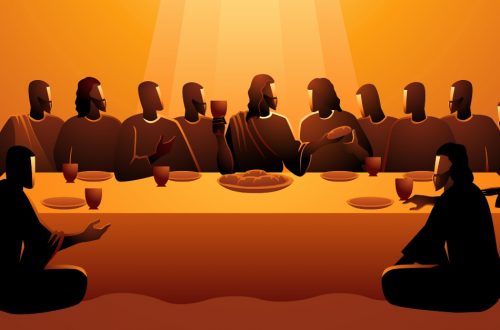“Christian” Homosexuality Advocates, part 2
“They want to be teachers of the law, but they do not understand what they are saying or the things they insist on so confidently” (1 Timothy 1:7).
These columns are in response to a reader named Donald, who wrote to me in the comments section of my column entitled, “Should a Christian Attend a Homosexual Wedding?” In his comments, Donald laid the foundation for reinterpreting or dismissing the passages of Scripture which teach that homosexuality is a sin. (For part one of this series, see here.) In his response we read, “I do not see Scripture as saying that every homosexual act is a sin, although some translations may say this; this means I think those translations are flawed.”
Later he writes, “My take is that each book of Scripture was written to an original audience [and] the culture of that audience, this is how they would know how to understand it. But time marches on and that culture is not our culture.” He then writes, “Some of the laws found in Exodus-Deuteronomy serve as identity markers for being a member of Israel and this group is later called Jews, so they are typically known as Jewish identity markers…. It turns out that the prohibition of male homosexual relations is a Jewish identity marker. This is because such acts for an Israelite/Jew are called an abomination, just like for a Jew eating unclean animals like pork or shellfish is called an abomination.”
As always, homosexuality advocates attempt to undermine and/or explain away every verse in Scripture which condemns homosexuality. Donald is no exception. They often begin with the Leviticus injunction:
“You shall not lie with a male as one lies with a female; it is an abomination” (Leviticus 18:22, NASB).
The language is straightforward and easily understood in context. But homosexuality advocates have often attempted to say that verses such as this only forbid homosexual acts as a form of worship, a context not even present in Leviticus 18. (Read the chapter for yourself.) They point out that the nations surrounding Israel worshipped their false gods by sleeping with both female and male temple prostitutes, but God forbade the Jews from worshipping Him in any such manner. In their argument they often bring up the word translated “abomination” in the Leviticus verse above, the Hebrew “toevah” or “toebah”.[1] Such people say that “toevah/toebah” is only used when God is communicating what things are strictly forbidden in relation to worship of Him.
Donald tries an argument along this same lines when he writes, “It is… worth doing a word study on Hebrew ‘toevah’ translated as ‘abomination’ throughout Scripture and see that something can be an abomination for one group of people and not another and that there is something that is called an abomination to God, which no one should do.”
So I accepted Donald’s challenge.
With the help of Young’s Analytical Concordance to the Bible and the NET study tools, I did a word study on the Hebrew “toevah”, the word often translated “abomination” or “detestable” in the Old Testament. I wanted to see if this word pointed only to things that were considered abominations for the Jews, violations of “Jewish identity markers” as Donald worded it. Was the sin of homosexuality, in fact, the equivalent of eating pork or shellfish?
The answer is NO.
I begin with Leviticus 18 and the laws forbidding certain kinds of sexual relations: Here we read, among other things, that God forbids incest (18:6, etc.), committing adultery (18:20), homosexuality (It is “toevah”.), and bestiality (18:23). All these forms of sexual activity are strictly forbidden by God. We then read,
“You yourselves must obey my statutes and my regulations and must not do any of these abominations [toevah], both the native citizen and the resident foreigner in your midst, for the people who were in the land before you have done all these abominations [toevah], and the land has become unclean. So do not make the land vomit you out because you defile it just as it has vomited out the nations that were before you. For if anyone does any of these abominations [toevah], the persons who do them will be cut off from the midst of their people. You must obey my charge to not practice any of the abominable [toevah] statutes that have been done before you, so that you do not defile yourselves by them. I am the Lord your God’” (Leviticus 18:26-30).
This statement alone demonstrates that these laws were not only for the Jewish people; they were not simply “Jewish identity markers”. They were also not only regarding ceremony or worship. How so?
First, because in the passage above, which summarizes the whole grouping of Leviticus 18 laws, we read that all of those things were “toevah”, not only homosexuality. That means incest, adultery, homosexuality, and bestiality are all abominations and detestable. Using the logic of those who say that these practices were only abominations to God if practiced as a form of worship, but they were not forbidden otherwise, then we would have to conclude that incest, adultery, homosexuality, and bestiality were not violations if practiced outside of worship. This is complete foolishness.[2]
And if Donald’s argument is true, that such things were only Jewish identity markers for people way back then, a way of denoting a separation of God’s people, along the lines of not eating pork or shellfish, then we would have to conclude that none of them would be forbidden for the non-Jewish nations back then, nor would they be forbidden for people today. The latter, at least, seems to be the major thrust of Donald’s argument.
This passage, however, destroys both attempts at explaining away “toevah” since the attempt to set homosexuality free, also sets incest, adultery, and bestiality free. They are all inextricably linked together in the above passage. I know homosexuality advocates get mad when such sins are linked together, but they cannot escape Leviticus 18. The link comes from the true context of the passages. All of these things are detestable before God.
Secondly, if these commands were only “Jewish identity markers”, if they were only considered abominations and sins for the Jews, then why were the nations before Israel “vomited out” for practicing them? If those laws against incest, adultery, homosexuality, and bestiality were given only to the Jews, then why did God punish non-Jews for these practices and behaviors? In Leviticus 20:23 we read that God was disgusted by the practices of the nations whom Israel was displacing. Why would this be if, as Donald has told us they were only “abominations” for the Jews? We read elsewhere that God condemned unbelieving nations for their filthiness and “toevah” abominations (Ezra 9:11). We also see “toevah” in Deuteronomy chapter 25, where God gives various instructions including not using dishonest weights and measures, presumably in business dealings, “For anyone who acts dishonestly in these ways is abhorrent [toevah] to the Lord your God” (Deuteronomy 25:16). If Donald is correct in his assessment of this word, it would mean that only Jews could not act dishonestly in business, but God would not care if non-Jews were dishonest in this way. And, of course, not being of that culture, the rest of us could have dishonest scales if we so desired. No, “The LORD abhors [toevah] dishonest scales” (Proverbs 11:1). Period. These things show us the character of God.
We see this repeated all over the Old Testament. The things God condemns and calls abhorrent, detestable, and abominations apply to everyone, Jew and non-Jew alike. In Scriptures we see God condemn greed, dishonest gain, and deceit:
“Are they ashamed because they have done such shameful [toevah] things? No, they are not at all ashamed. They do not even know how to blush! So they will die, just like others have died” (Jeremiah 6:15).
Whenever I read the above passage and others like it I am remind of certain groups today which proudly parade their sin and disgrace. “Are they ashamed?” God tells us through the prophet, “They do not even know how to blush!” How true this is today.
The Old Testament tells us that stealing, murder, adultery, and worshipping false Gods, are also all “toevah” (Jeremiah 7:9-10). What would Donald’s logic tell us in these cases?
Donald’s argument easily crumbles when we do the study which he recommended.
“How can you say, ‘We are wise! We have the law of the Lord’? The truth is, those who teach it have used their writings to make it say what it does not really mean” (Jeremiah 8:8).
In Proverbs 3 we read that we should not withhold good or plot evil or falsely accuse others, nor should we envy or imitate the violent or wicked, “for one who goes astray is an abomination [toevah] to the Lord” (Proverbs 3:32). Later in Proverbs we read, “There are six things that the Lord hates, even seven things that are an abomination [toevah] to him: haughty eyes, a lying tongue, and hands that shed innocent blood, a heart that devises wicked plans, feet that are swift to run to evil, a false witness who pours out lies, and a person who spreads discord among family members” (Proverbs 6:16-19). The perverse in heart is “toevah” (Proverbs 11:20), the arrogant (Proverbs 16:5), those who acquit the guilty and condemn the innocent (Proverbs 17:15), as well as the prayers of those who turn away from God’s laws (Proverbs 28:9), all are “toevah”.
Did you catch that last one?
“If anyone turns a deaf ear to the law, even his prayers are detestable [toevah]” (Proverbs 28:9, NIV).
That is, if anyone ignores what God has said, such a person’s prayers, conversations or pleas with God are also an abomination, detestable, and abhorrent.
It is important to note that nowhere do we find God telling His prophets and people that the nations prior to Israel were judged, vomited out of the land, or destroyed for violating actual “Jewish identity markers”; those nations were never judged for eating pork and shellfish or for wearing clothing made from two different kinds of cloth.
In pointing to the difference between ceremonial law (“Jewish identity markers” if you will) and moral law (the latter being applicable to all people in all times and places) James R. White and Jeffrey D. Niell, authors of “The Same Sex Controversy” write, “The Bible is unambiguous at this point. As far as this distinction is concerned, one of the ways that we are to biblically distinguish between the ceremonial and moral precepts of God’s Law is to recognize that the moral law was required of persons outside Israel.”[3] They point out that God, through his prophets, warned and condemned the nations who were not Israel about their sin and wickedness. Those nations were never condemned for failing to circumcise their sons or for failing to make it to Jerusalem for the prescribed feasts. These authors also point out that there is a category of sin in the Old Testament in which the prescribed penalty was death (adultery, homosexuality, bestiality, etc.). This was never the prescribed penalty for violations of ceremonial laws or “Jewish identity markers”.
Romans 1, another portion of Scripture despised by homosexuality advocates, tells us that the whole world is held accountable before God because what may be known about Him is known to all; yet it is suppressed by their sin and wickedness: “Although they fully know God’s righteous decree that those who practice such things deserve to die, they not only do them but also approve of those who practice them” (Romans 1:32). This is an injunction against all mankind and all nations, not only the Jews. Unfortunately, homosexuality advocates and liberal “Christians” have been doing just that, saying with their father, “Surely you will not die” (Genesis 3:4, John 8:44) and approving the practices which God calls sin.
“I insist that wherever you draw the lines, bounding lines must exist, beyond which your doctrine will cease to be… Christian: and I suggest also that the lines come a great deal sooner than many modern[s] think,” wrote C.S. Lewis, regarding liberal priests and preachers. He continued: “A ‘liberal’ Christianity which considers itself free to alter the Faith whenever the Faith looks perplexing or repellent [to them] must be completely stagnant.”[4]
Or non-existent I would say.
“But we know that the law is good if someone uses it legitimately, realizing that law is not intended for a righteous person, but for lawless and rebellious people, for the ungodly and sinners, for the unholy and profane, for those who kill their fathers or mothers, for murderers, sexually immoral people, practicing homosexuals, kidnappers, liars, perjurers – in fact, for any who live contrary to sound teaching. This accords with the glorious gospel of the blessed God that was entrusted to me” (1 Timothy 1:8-11).
“Therefore, although God has overlooked such times of ignorance, he now commands all people everywhere to repent, because he has set a day on which he is going to judge the world in righteousness, by a man whom he designated, having provided proof to everyone by raising him from the dead” (Acts 17:30-31).
______________________
Read "Should a Christian Attend a Homosexual Wedding?"
Read "Christian" Homosexuality Advocates
Read my other Bible.org columns here: http://blogs.bible.org/blog/26077
[1] Forgive me but I do not know Hebrew. Therefore I rely on the study tools provided by the folks at NET (Bible.org) and Young’s Analytical Concordance.
[2] I note that the word “fool”, as used in Proverbs 1:7 for instance, was explained thus: “The Hebrew words rendered fool in Proverbs, and often elsewhere in the Old Testament, denote one who is morally deficient” (NIV 1984). One who strays in these sinful ways is seen as having a broken moral compass.
[3] James R. White and Jeffrey D. Niell, “The Same Sex Controversy” copyright 2002, published by Bethany House Publishers, page 85.
[4] From an essay entitled “Christian Apologetics” by C.S. Lewis, from God in The Dock, copyright 1970 by The Trustees of the Estate of C.S. Lewis, pages 89 & 91.




